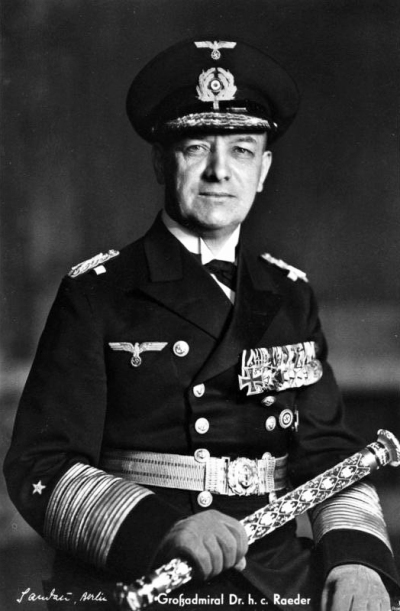Final statement Erich Raeder
THE PRESIDENT: I call upon the Defendant Erich Raeder.
ERICH RAEDER (Defendant): This Trial, now that the evidence has been concluded, has had a beneficial result for the German nation; but an unexpected one for the Prosecution. Unimpeachable testimony has cleared the German people - and with them all the persons in the same situation as myself - of the most serious charge, the charge that they had known of the killing of millions of Jews and other people, if they had not actually participated in it. The attempt of the Prosecution, who through earlier interrogations had known the truth for a long time and who nevertheless continued and repeated their accusations with the raised finger of the preacher of morals in the trial briefs and during cross-examinations, this attempt to defame the entire people has collapsed upon itself.The second result of this Trial, which is general and therefore of interest for me also, is the fact that on the basis of the evidence the German Navy's cleanness and decency in battle were fundamentally confirmed. The German Navy stands before this Court and before the world with a clean shield and an unstained flag.
With a clear conscience we can most emphatically refute Shawcross's attempts in his final speech to place the submarine warfare on the same level with atrocities, because according to the clear results of the evidence they are untenable, In particular the charge that the German Navy never had the intention to observe the laws of naval warfare, as Shawcross said, Pages 70 and 71, has been completely invalidated. It has likewise been proved that the Naval Operations Staff and its chief never showed contempt for international law' (Dubost's final speech), but on the contrary made an honest endeavor from the first to the very last moment to bring the conduct of modern naval warfare into harmony with the requirements of international law and humanity, on the same basis as our opponents.
I regret that the Prosecution tried again and again to defame the German Navy and myself, as was shown by the submission of its second modified trial brief, which differs from the first version only in that the number and severity of insulting statements have been increased. This fact shows that the prosecutors themselves felt that the factual accusations were too weak. But it is also my conviction that the British and American Prosecution have rendered ill service to their own Navies by morally defaming and characterislng as inferior the opponent against whom the Allied naval forces waged hard and honorable naval war over a number of years. I am convinced that the admiralties of the Allied powers understand me and that they know that they have not fought against a criminal.
The only way I can explain to myself this attitude adopted by the Prosecution is by assuming that its representatives, as I necessarily perceived again and again, revealed only very little judgment regarding the principles of truly soldier-like conduct and military leadership and that, therefore, they hardly seem qualified to judge soldierly honor.
To sum up: I have done my duty as a soldier because it was my conviction that this was the best way for me to serve the German people and fatherland, for which I have lived and for which I am prepared to die at any moment. If I have incurred guilt in any way, then this was chiefly in the sense that in spite of my purely military position I should perhaps have been not only a soldier, but also up to a certain point a politician, which, however, was in contradiction to my entire career and the tradition of the German Armed Forces. But then this would have been a guilt, a moral guilt, towards the German people, and could never at any time brand me as a warcriminal. It would not have been guilt before a human criminal court, but rather guilt before God.
See also: Verdict Raeder
Definitielijst
- Jews
- Middle Eastern people with own religion that lived in Palestine. They distinguished themselves by their strong monotheism and the strict observance of the Law and tradition. During World War 2 the Jewish people were ruthlessly persecuted and annihilated by the German Nazis. . An estimated 6,000,000 Jews were exterminated.
- moral
- The will of the troops/civilians to keep fighting.
Images
 Erich Raeder C-in-C Kriegsmarine between 1935 and 1943. Source: Bundesarchiv, Bild 146-1980-128-63 / CC-BY-SA 3.0.
Erich Raeder C-in-C Kriegsmarine between 1935 and 1943. Source: Bundesarchiv, Bild 146-1980-128-63 / CC-BY-SA 3.0.Information
- Published by:
- Arnold Palthe
- Published on:
- 05-01-2016
- Last edit on:
- 11-01-2019
- Feedback?
- Send it!
Sources
International Military Tribunal, Nuremberg 1947



